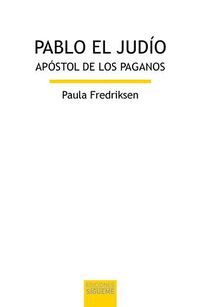Difference between revisions of "File:2017 * Fredriksen.jpg"
m (Gabriele Boccaccini moved page File:2017 Fredriksen.jpg to File:2017 * Fredriksen.jpg without leaving a redirect) |
|||
| (3 intermediate revisions by the same user not shown) | |||
| Line 1: | Line 1: | ||
'''Paul: The Pagans' Apostle ''' (2017) is a book by [[Paula Fredriksen]]. | [[File:2019-T Fredriksen es.jpg|thumb|200px]] | ||
{en} [[Paula Fredriksen]]. '''''Paul: The Pagans' Apostle''''' (New Haven : Yale University Press, 2017) is a book by . | |||
* Spanish ed. : [[Paula Fredriksen]]. '''''Pablo el judío: Apóstol de los paganos'''''. Ediciones Sígueme, 2019. | |||
==Abstract== | ==Abstract== | ||
"Often seen as the author of timeless Christian theology, Paul himself heatedly maintained that he lived and worked in history's closing hours. His letters propel his readers into two ancient worlds, one Jewish, one pagan. The first was incandescent with apocalyptic hopes, expecting God through his messiah to fulfill his ancient promises of redemption to Israel. The second teemed with ancient actors, not only human but also divine: angry superhuman forces, jealous demons, and hostile cosmic gods. Both worlds are Paul's, and his convictions about the first shaped his actions in the second. Only by situating Paul within this charged social context of gods and humans, pagans and Jews, cities, synagogues, and competing Christ-following assemblies can we begin to understand his mission and message. This original and provocative book offers a dramatically new perspective on one of history's seminal figures."--Publisher description. | "Often seen as the author of timeless Christian theology, Paul himself heatedly maintained that he lived and worked in history's closing hours. His letters propel his readers into two ancient worlds, one Jewish, one pagan. The first was incandescent with apocalyptic hopes, expecting God through his messiah to fulfill his ancient promises of redemption to Israel. The second teemed with ancient actors, not only human but also divine: angry superhuman forces, jealous demons, and hostile cosmic gods. Both worlds are Paul's, and his convictions about the first shaped his actions in the second. Only by situating Paul within this charged social context of gods and humans, pagans and Jews, cities, synagogues, and competing Christ-following assemblies can we begin to understand his mission and message. This original and provocative book offers a dramatically new perspective on one of history's seminal figures."--Publisher description. | ||
==Contents== | ==Contents== | ||
| Line 29: | Line 29: | ||
[[Category:Jewish views of Paul (subject)]] | [[Category:Jewish views of Paul (subject)]] | ||
[[Category:Paul & Judaism (subject)]] | [[Category:Paul & Judaism (subject)]] | ||
[[Category:Paul within Judaism (subject)]] | |||
[[Category:Top 2010s]] | [[Category:Top 2010s]] | ||
[[Category:2010s]] | [[Category:2010s]] | ||
[[Category:Pauline Studies]] | [[Category:Pauline Studies]] | ||
Latest revision as of 16:02, 9 August 2023
{en} Paula Fredriksen. Paul: The Pagans' Apostle (New Haven : Yale University Press, 2017) is a book by .
- Spanish ed. : Paula Fredriksen. Pablo el judío: Apóstol de los paganos. Ediciones Sígueme, 2019.
Abstract
"Often seen as the author of timeless Christian theology, Paul himself heatedly maintained that he lived and worked in history's closing hours. His letters propel his readers into two ancient worlds, one Jewish, one pagan. The first was incandescent with apocalyptic hopes, expecting God through his messiah to fulfill his ancient promises of redemption to Israel. The second teemed with ancient actors, not only human but also divine: angry superhuman forces, jealous demons, and hostile cosmic gods. Both worlds are Paul's, and his convictions about the first shaped his actions in the second. Only by situating Paul within this charged social context of gods and humans, pagans and Jews, cities, synagogues, and competing Christ-following assemblies can we begin to understand his mission and message. This original and provocative book offers a dramatically new perspective on one of history's seminal figures."--Publisher description.
Contents
Introduction : The Message and the Messenger -- [Part] One. Israel and the Nations. Beginnings. God and Cosmos -- God and Humanity -- God and Israel -- Kingdom and Exile. David's House, and God's -- Prophecy and Promise -- The Expectation of Redemption -- [Part] Two. Fatherland and Mother City. Jews in Pagan Places -- Pagans in Jewish Places. The Temple -- The Synagogue -- [Part] Three. Paul : Mission and Persecution. Who Was Paul, and How Do We Know? -- Jews, Born and Made -- Circumcising Missions? -- Eschatological Gentiles -- Witness, Resistance, and "Persecution" -- [Part] Four. Paul and the Law. The Gospel and Gentile Circumcision -- The "Law-Free" Mission and the "'Law-Free" Apostle?. Gods and the One God -- Ethnic Distinctions -- The Law, the Ethne, and "Justification by Faith" -- The Law's Curse -- [Part] Five. Christ and the Kingdom. Christ, the Son of David, Part 1 : The Eschaton -- Christ, the Son of David, Part 2 : Romans -- Intermezzo : The Turning of the Nations. Lineage/Huiothesa -- Separation/Hagiasmos -- The Choral Symphony : Paul's Letter to the Romans. Romans 2-7 : Problems with Gentile Judaizing -- Romans 9-11 : Israel and the Nations -- Postscript.
External links
File history
Click on a date/time to view the file as it appeared at that time.
| Date/Time | Thumbnail | Dimensions | User | Comment | |
|---|---|---|---|---|---|
| current | 00:42, 17 July 2018 |  | 329 × 499 (18 KB) | Gabriele Boccaccini (talk | contribs) |
You cannot overwrite this file.
File usage
There are no pages that use this file.
